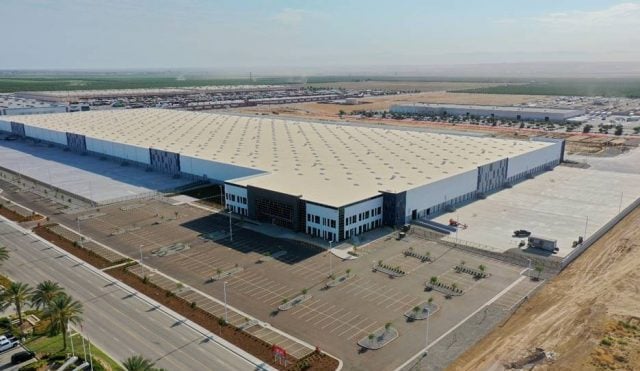
IRVINE, CA—Irvine has access to substantial fiber optics from numerous telecom providers and abundant power availability, and the data centers also serve the growing base of tech companies in the area, HFF West Coast leader Kevin MacKenzie tells GlobeSt.com. The firm recently secured a $62.5-million refinancing for Irvine Crossings, a 395,673-square-foot, single-story data center and industrial property in the Airport are, on behalf of the borrower Menlo Equities. HFF placed the five-year, full-term interest only, fixed-rate financing with Deutsche Bank.
MacKenzie tells us exclusively that there are six or seven other datacenters in the Irvine area, so we asked him what factors make this market attractive to these users. “Irvine has access to substantial fiber optics from numerous telecom providers and abundant power availability, which is why there are six or seven other datacenters in the area,” said MacKenzie. “These also serve the growing base of technology companies in the area.”
In discussing the challenges of financing these properties, MacKenzie said, “The technology infrastructure in the buildings is a substantial capital investment, leading to higher rents, but it also makes these facilities extremely difficult and costly to relocate, especially when they are third-co-location providers that provide other area businesses with access to the fiber optic redundancy, power, HVAC capacity, etc. However, lenders still often have heartburn over underwriting the higher rents per square foot and higher loan basis. They instead like to underwrite to more traditional office or industrial rents (depending on the project), and that typically cuts proceeds significantly.”
As we reported in April, Tim Huffman, EVP of Colliers International, told us that data-center sale/leasebacks make sense for investors who are seeking limited tenant turnover, high cap rates and TIs that keep the property current. Those TIs are also often paid for by the tenants. While not one of the most talked about property types in commercial real estate, data centers are highly sought after as sale/leasebacks by a number of REITs attracted to their low maintenance and strong yields.
The core drivers creating interest from investors in data-center sale/leasebacks start with the tenant profile: a company with a mission-critical operation—describing hardware or software that's vital to the functioning of an organization—in a building. “It's a very sticky kind of tenant,” Huffman explained. “It's very disruptive for tenants to move their IT equipment. When an investor owns a building like this and has 15 to 20 years on a lease, it's a pretty good bet that the tenant—and it's usually a credit tenant—will not leave and will invest a lot of money in the building.”

IRVINE, CA—Irvine has access to substantial fiber optics from numerous telecom providers and abundant power availability, and the data centers also serve the growing base of tech companies in the area, HFF West Coast leader Kevin MacKenzie tells GlobeSt.com. The firm recently secured a $62.5-million refinancing for Irvine Crossings, a 395,673-square-foot, single-story data center and industrial property in the Airport are, on behalf of the borrower Menlo Equities. HFF placed the five-year, full-term interest only, fixed-rate financing with
MacKenzie tells us exclusively that there are six or seven other datacenters in the Irvine area, so we asked him what factors make this market attractive to these users. “Irvine has access to substantial fiber optics from numerous telecom providers and abundant power availability, which is why there are six or seven other datacenters in the area,” said MacKenzie. “These also serve the growing base of technology companies in the area.”
In discussing the challenges of financing these properties, MacKenzie said, “The technology infrastructure in the buildings is a substantial capital investment, leading to higher rents, but it also makes these facilities extremely difficult and costly to relocate, especially when they are third-co-location providers that provide other area businesses with access to the fiber optic redundancy, power, HVAC capacity, etc. However, lenders still often have heartburn over underwriting the higher rents per square foot and higher loan basis. They instead like to underwrite to more traditional office or industrial rents (depending on the project), and that typically cuts proceeds significantly.”
As we reported in April, Tim Huffman, EVP of Colliers International, told us that data-center sale/leasebacks make sense for investors who are seeking limited tenant turnover, high cap rates and TIs that keep the property current. Those TIs are also often paid for by the tenants. While not one of the most talked about property types in commercial real estate, data centers are highly sought after as sale/leasebacks by a number of REITs attracted to their low maintenance and strong yields.
The core drivers creating interest from investors in data-center sale/leasebacks start with the tenant profile: a company with a mission-critical operation—describing hardware or software that's vital to the functioning of an organization—in a building. “It's a very sticky kind of tenant,” Huffman explained. “It's very disruptive for tenants to move their IT equipment. When an investor owns a building like this and has 15 to 20 years on a lease, it's a pretty good bet that the tenant—and it's usually a credit tenant—will not leave and will invest a lot of money in the building.”
© 2025 ALM Global, LLC, All Rights Reserved. Request academic re-use from www.copyright.com. All other uses, submit a request to [email protected]. For more information visit Asset & Logo Licensing.








